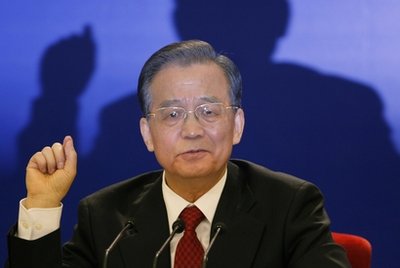China PM defends assertive trade, foreign policy
BEIJING: China sought Sunday to deflate rising pressure from the U.S. and other powers over Chinese economic policies and growing assertiveness in world affairs, with its prime minister promising cooperation to bolster the global recovery.
Premier Wen Jiabao took on critics in the West who say Chinese policies lift China while keeping global growth anemic. He defended China's currency against charges that it is undervalued to boost Chinese exports. He promised that Beijing would import more and urged countries to resist protectionism, saying one country should not seek to disadvantage others during the fragile economic recovery.
"We are opposed to the position of engaging in mutual finger-pointing or taking strong measures to force other countries to adjust exchange rates," Wen said in a more than two-hour news conference.
Wen also criticized Washington for souring relations with the recent White House reception for the Dalai Lama, the exiled leader of Chinese-controlled Tibet, and for approving arms sales to Taiwan, which China claims as its own. "The responsibility does not lie with the Chinese side, but the United States," he said.
His arguments, while breaking little new ground, were offered in Wen's characteristically mild, carefully rational manner. No. 3 in the Communist Party hierarchy and chiefly in charge of the economy, Wen is also the generally stiff leadership's most popular figure; grand-fatherly and solicitous, he is known as the "people's premier."
His news conference is the only one Wen holds all year and is thus often used by the government to send a message to the public and world. Questions from the foreign and domestic media were prescreened.
This year, Beijing is on the defensive in Western capitals. Beijing's seeming intransigence at climate change talks in Copenhagen riled some. Other governments are grappling with high rates of unemployment and swelling deficits to fend off recession, even as the Chinese economy bounced back to 10.7 percent growth last year. The Chinese currency, known as the yuan or the renminbi, has become a focal point for criticism in Washington, Europe and other countries.
U.S. President Barack Obama in a speech last Thursday urged China to move "to a more market-oriented exchange rate" to help rebalance world growth. More ominously, the Treasury Department must report to Congress in April whether China qualifies as a "currency manipulator" — a label that could precede a complaint to the World Trade Organization and possible sanctions on Chinese goods.
With these storm clouds brewing, Wen said more coordination was needed among economic powers to prevent the world economy from sagging into a "double-dip" recession. He cited high unemployment rates, debt crises in nations such as Greece and high government deficits abroad, while at home, he said, there are worries about inflation and businesses' over-reliance on the massive stimulus and loans China used last year to keep the economy running.
"I believe that free trade not only promotes growth of the world economy. At the same time, it promotes harmony in the world and changes and improves people's lives," Wen said.
Wen spoke following the closing of the annual session of the party-dominated national legislature, which earlier Sunday approved a blueprint to keep government spending high, though at half the rate of last year, to buffer any economic turbulence. Sizable increases were given to education, pensions and low-cost housing — part of a yearslong effort by Wen and President Hu Jintao to more fairly spread the benefits of growth among rural and working-class Chinese.
Wen spoke frankly that economic ills left untended could threaten Communist rule. A particularly toxic combination, he said, were inflation, the rich-poor income gap and corruption — all current problems.
"These will be strong enough to affect our social stability and even the stability of state power," he said.
Normally high security in Beijing was tightened further in the past two weeks for the National People's Congress and a meeting of the top government advisory body. After Wen's news conference, police dragged away and put into a van at least two people — one of whom was complaining about a housing dispute — as they tried to get the attention of officials and reporters outside the hulking Great Hall of the People. A third person, who said he was a teacher, was led away separately.
Turning the tables on the U.S., Wen renewed appeals for assurances from Washington about the safety of China's $800 billion in foreign exchange reserves invested in U.S. Treasury securities. Wen said the value of the U.S. dollar was a "big concern" and asked Washington to take unspecified steps to reassure investors.
Wen also fired back at critics of China's performance at the last year's Copenhagen climate change conference. Asked why he skipped a meeting of some foreign leaders, including Obama, Wen said he was snubbed, having never been formally invited, and so sent a vice foreign minister instead.
"So far no one has given us any explanation about this and it still is a mystery," he said.
When asked if China would play a bigger role in international affairs, Wen said China is still a developing country, focused on improving living standards, and even when rich and powerful, it would not seek to dominate others.






